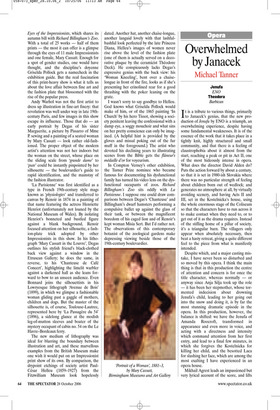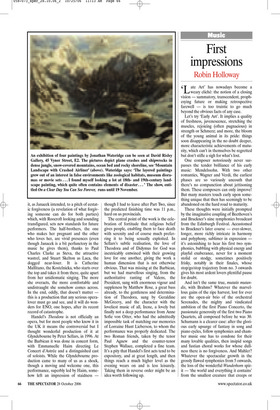Overwhelmed by Janacek
Michael Tanner
Jenufa ENO Theodora Barbican
It is a tribute to various things, primarily to Janacek’s genius, that the new production of Jenufa by ENO is a triumph, an overwhelming experience, despite having some fundamental weaknesses. It is of the essence of the work that it takes place in a tightly knit, highly structured and small community, and that there is a feeling of claustrophobia about it almost from the start, reaching a peak or pit in Act II, one of the most hideously intense in opera. What does the director David Alden do? Puts the action forward by about a century, so that it is set in 1980-ish Slovakia where there was no particular strength of feeling about children born out of wedlock; and generates no atmosphere at all, by virtually avoiding scenery, and having Acts II and III, set in the Kostelnicka’s house, using the whole enormous stage of the Coliseum so that the characters have to run across it to make contact when they need to, or to get out of it as the drama requires. Instead of the stifling home of a pillar of society, it’s a triangular barn. The villagers only appear when absolutely necessary, then beat a hasty retreat, giving a quite different feel to the piece from what is manifestly intended.
Despite which, and a major casting mistake, I have never been so disturbed and so moved by this opera. I think the main thing is that in this production the centre of attention and concern is for once the title character, whereas normally — or anyway since Anja Silja took up the role — it has been her stepmother, whose tormented indecision about drowning Jenufa’s child, leading to her going out into the snow and doing it, is by far the most stunning dramatic episode in the opera. In this production, however, the balance is shifted: we have the Jenufa of Amanda Roocroft, transformed in appearance and even more in voice, and acting with a directness and intensity which command attention from her first entry, and lead to a final few minutes, in which she forgives the Kostelnicka for killing her child, and the besotted Laca for slashing her face, which are among the most exalting I have experienced in an opera house.
Mikhail Agrest leads an impassioned but very lyrical account of the score, and lifts it, as Janacek intended, to a pitch of ecstatic forgiveness (a revelation of what forgiving someone can do for both parties) which, with Roocroft looking and sounding transfigured, sets new standards for future performers. The half-brothers, the one who makes her pregnant and the other who loves her, are vivid presences (even though Janacek is a bit perfunctory in the music he gives them), thanks to Paul Charles Clarke as Steva, the attractive wastrel, and Stuart Skelton as Laca, the dogged near-loser. It is Catherine Malfitano, the Kostelnicka, who starts over the top and takes it from there, quite apart from her unidiomatic singing. The more she overacts, the more comfortable and undistraught she somehow comes across. In the end, oddly, that doesn’t matter this is a production that any serious operalover must go and see, and it will do wonders for ENO, one hopes, after its recent record of catastrophe.
Handel’s Theodora is not officially an opera, but for most people who know it in the UK it means the controversial but I thought wonderful production of it at Glyndebourne by Peter Sellars, in 1996. At the Barbican it was done in concert form, with Emmanuelle Haim directing Le Concert d’Astrée and a distinguished cast of soloists. While the Glyndebourne production came to many of us as a shock, though a moving and welcome one, this performance, superbly led by Haim, somehow left an impression of staidness — though I had to leave after Part Two, since the predicted finishing time was 11 p.m., hard on us provincials.
The central point of the work is the celebration of fortitude that religious belief gives people, enabling them to face death with serenity and of course much preferring it to being sexually exploited. In Sellars’s subtle realisation, the love of Theodora and of Didymus for God was inextricably entwined with their growing love for one another, giving the work a human dimension that is not otherwise obvious. That was missing at the Barbican, but we had marvellous singing, from the authoritative ranting of Valens, the President, sung with enormous vigour and suppleness by Matthew Rose, a great bass already, to the gentleness and determination of Theodora, sung by Geraldine McGreevy, and the character with the loveliest music of all, Irene, a lovely but finally not a deep performance from Anne Sofie von Otter, who had the admittedly impossible task of matching our memories of Lorraine Hunt Lieberson, to whom the performance was properly dedicated. The two Roman friends, taken by the tenor Paul Agnew and the counter-tenor Stephen Wallace, completed a fine team. It’s a pity that Handel’s first acts tend to be expository, and at great length, and then things reach a much higher level as the evening wears on and is less leisurely. Taking them in reverse order might be an idea worth following up.



























































































 Previous page
Previous page